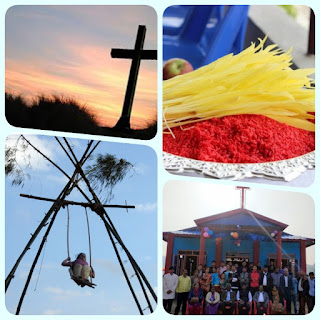Dashain, the grandest festival in Nepal, holds a special place in the hearts of many Nepalis, drawing families together from cities and abroad. It symbolizes joy and celebration, embodying a festive spirit across the nation. However, the religious undertones associated with Dashain, rooted in Hindu beliefs, pose a dilemma for Nepali Christians who strive to uphold their faith. This conflict often leads to a conscious avoidance of Dashain, creating a divide between Nepali Christians and their families and communities.
Historically, Nepali kings were revered as divine figures, intertwining religion with the political and social structures. This deep connection between governance and spirituality has shaped the Nepali identity. The arrival of Christianity, seen as a potential threat to this established system, led to the expulsion of early Catholic missionaries. Foreign missionaries were subsequently barred from entry, reflecting the resistance to external religious influences.
The political transformation in the twenty-first century, marked by a shift towards a more democratic system, is sometimes attributed to Christian influence. However, until this period, Christianity remained a minority in Nepal without significant political sway. Nepali Christians, often perceived as followers of a foreign religion, faced challenges as they navigated their commitment to Jesus within the context of traditional Hindu practices.
The central predicament revolves around Dashain, where Nepali Christians, out of a desire to remain faithful to their beliefs, abstain from family and social events. This avoidance, while rooted in religious conviction, results in criticism from loved ones who continue to practice these traditional festivals. Nepali Christians, torn between their faith and familial obligations, grapple with a sense of guilt during these crucial family moments.
The question arises: Can Nepali Christians be part of this national celebration while remaining faithful to their commitment to Jesus? Exploring this query requires considering various dimensions. Firstly, does any involvement in Dashain lead to idolatry? Secondly, what does the Bible say about such situations? Lastly, how can Nepali Christians fulfill their Christian duties, including the great commission, amidst cultural and familial challenges?
The issue of idolatry is fundamental for Christians, with the Bible strictly prohibiting the worship of idols (Exodus 20, the Ten Commandments). However, the question arises whether simple participation in Dashain with family constitutes idolatry. The New Testament offers a nuanced perspective, redefining idolatry as a matter of the heart rather than mere physical activities.
Examining 1 Corinthians 8:1-8, Paul acknowledges that associating with those who worship idols does not defile a person. While Nepali Christians are not free to worship idols, they are not prohibited from maintaining cordial relationships with non-believing family members and neighbors.
The biblical record of Naaman and Elisha in 2 Kings Chapter 5 provides parallels to the predicament of Nepali Christians. Naaman, a former idol worshiper, sought forgiveness for being compelled to participate in idolatrous activities. Similarly, Nepali Christians who feel compelled to partake in Dashain festivities should not harbor guilt, as their commitment to Jesus remains unwavering in their hearts.
Fulfilling the great commission involves more than verbally sharing the gospel. Acts 1:8 emphasizes being witnesses of Jesus in one's immediate surroundings and the broader world. For Nepali Christians, this encompasses engaging with family and neighbors, showcasing self-sacrificing love and forgiveness in their lives, attitudes, and relationships.
In the face of an anti-religious conversion law in Nepal, a less confrontational method of evangelism becomes imperative. Peter's exhortation in 1 Peter 2:12 encourages believers to live such good lives among non-believers that they may see their good deeds and glorify God.
Presently, Nepali Christians are often perceived as followers of a foreign religion. Rejecting customs like Dashain may inadvertently reinforce this perception. Instead, the focus should be on projecting love, as emphasized in John 13:34-35. Nepali Christians should strive to be known for their love rather than mere rejection of cultural traditions.
As Dashain approaches, the hope is for Nepali Christians to seize the opportunity to share love with their non-believing family members and neighbors. Balancing faith commitments with cultural practices requires thoughtful consideration, encouraging a shift from a flat rejection to a demonstration of the transformative power of Christian love.

